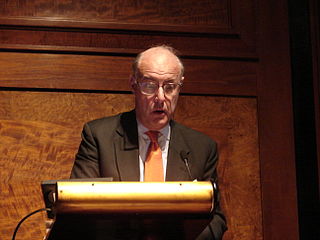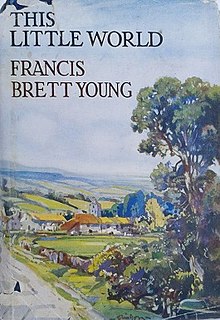
Andrew William Mellon, sometimes A.W., was an American banker, businessman, industrialist, philanthropist, art collector, and politician. From the wealthy Mellon family of Pittsburgh, Pennsylvania, he established a vast business empire before moving into politics. He served as United States Secretary of the Treasury from March 9, 1921, to February 12, 1932, presiding over the boom years of the 1920s and the Wall Street crash of 1929. A conservative Republican, Mellon favored policies that reduced taxation and the national debt in the aftermath of World War I.

Francis Brett Young was an English novelist, poet, playwright, composer, doctor and soldier.

George Macaulay Trevelyan was a British historian and academic. He was a Fellow of Trinity College, Cambridge, from 1898 to 1903. He then spent more than twenty years as a full-time author. He returned to the University of Cambridge and was Regius Professor of History from 1927 to 1943. He served as Master of Trinity College from 1940 to 1951. In retirement, he was Chancellor of Durham University.

The phrase "Middle England" is a socio-political term which generally refers to middle class or lower-middle class people in England who hold traditional conservative or right-wing views.
In many historical societies, the position of kingship carries a sacral meaning, that is, it is identical with that of a high priest and judge. The concept of theocracy is related, although a sacred king need not necessarily rule through his religious authority; rather, the temporal position has a religious significance.

John Patrick Crichton-Stuart, 3rd Marquess of Bute,, , was a landed aristocrat, industrial magnate, antiquarian, scholar, philanthropist, and architectural patron.

The landed gentry, or the gentry, is a largely historical British social class of landowners who could live entirely from rental income, or at least had a country estate. While distinct from, and socially below, the British peerage, their economic base in land was often similar, although in fact some of the landed gentry were wealthier than some peers, and many gentry were close relatives of peers, and it was not uncommon for gentry to marry into peerage. It is the British element of the wider European class of gentry. With or without noble title, owning rural land estates often brought with it the legal rights of lord of the manor, and the less formal name or title of squire, in Scotland laird.

Sir David Cannadine is a British author and historian who specialises in modern history, Britain and the history of business and philanthropy. He is currently the Dodge Professor of History at Princeton University, a Visiting Professor of History at Oxford University, and the editor of the Oxford Dictionary of National Biography. He has been the President of the British Academy since 2017, the UK's national academy for the humanities and social sciences. He also serves as the Chairman of the Trustees of the National Portrait Gallery in London and Vice-Chair of the Editorial Board of Past & Present.
Sir John (Jack) Harold Plumb was a British historian, known for his books on British 18th-century history. He wrote over thirty books.
The Institute of Historical Research (IHR) is a British educational organisation providing resources and training for historical researchers. It is part of the School of Advanced Study in the University of London and is located at Senate House. The Institute was founded in 1921 by A. F. Pollard.
The British nobility is made up of the peerage and the landed gentry. The nobility of its four constituent home nations has played a major role in shaping the history of the country, although now they retain only the rights to stand for election to the House of Lords, dining rights there, position in the formal order of precedence, the right to certain titles, and the right to an audience with the monarch. More than a third of British land is in the hands of aristocrats and traditional landed gentry.

The Westminster St. George's by-election, 1931 was a parliamentary by-election held on 19 March 1931 for the British House of Commons constituency of Westminster St. George's.
Harold James Dyos (1921–1978) was a British historian, known for his contributions to urban history. He wrote many essays addressing the issue of urbanization.

Ornamentalism: How the British Saw Their Empire is a book by David Cannadine about British perceptions of the British Empire. Cannadine argues that class, rank and status were more important to the British Empire than race. The title of the work Ornamentalism is a direct reference to Edward Said's book Orientalism, which argues the existence of prejudiced outsider interpretations of the East, shaped by the attitudes of European imperialism in the 18th and 19th centuries. It has also been argued to borrow tones from the title of Joseph Schumpeter's "Imperialism and Social Classes", which some historians see as the origins of the 'Ornamentalist' perspective in academic history'.

Victorious Century: The United Kingdom, 1800–1906 is a book by David Cannadine, the Dodge Professor of History at Princeton University and President of the British Academy. The book is about the Victorian era in nineteenth-century Britain. It begins with the Act of Union in 1800 and ends with the Parliamentary victory of the Liberal Party in 1906. Cannadine opens with the Charles Dickens' quote, "It was the best of times, it was the worst of times." He argues that Britain maintained its status as leader of the global economy and possessor of the largest navy in the world. At the same time, the country was plagued by internal problems and social conflicts. According to the Whig Interpretation of history, the "victorious century" represented a time of expanding democracy and wave of Parliamentary acts providing political reform and universal manhood suffrage. Cannadine argues,
"This was a country which saw itself at the summit of the world. And yet it was a society also convulsed by doubt, fear and introspection. Repeatedly, politicians and writers felt themselves to be staring into the abyss and what is seen as an era of irritating self-belief was in practice obsessed by a sense of its own fragility, whether as a great power or as a moral force. Victorious Century catches the relish and humour of the age, but also the dilemmas of a kind with which we remain familiar today."

My Brother Jonathan is a 1928 novel by the British writer Francis Brett Young. It portrays the life of an idealistic young doctor working in the Black Country before the First World War, forced to deal with the consequences of his irresponsible brother Harold.

This Little World is a 1934 novel by the British writer Francis Brett Young. It is set in a Worcestershire village in the early 1920s, where the recent First World War presages social change. It has a number of similarities with another of his books of the period Portrait of a Village, published three years later.

White Ladies is a 1935 novel by the British writer Francis Brett Young. The granddaughter of a wealthy tycoon and his well-bred wife becomes obsessed with recovering the family estate, the Elizabethan manor house named White Ladies. Like many of the author's Mercian novels, much of the novel is set in Worcestershire.

Portrait of Clare is a 1927 novel by the British writer Francis Brett Young. A commercial success, it also won the James Tait Black Memorial Prize.














